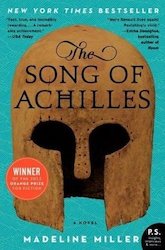
Retellings of old texts are in vogue these days. I find it ironic because a writing coach I once worked with briefly made me feel like a moron for proposing a retelling of one of Shakespeare’s tragedies in a contemporary setting. So I didn’t write it. That’s not to say I would have been successful, but I think it’s safe to say that the success of the Hogarth Shakespeare series the last few years demonstrates that I was a moron only for working with this “coach.”
Madeline Miller has set her sights on the much more ancient texts of the Greek poet Homer. In her debut novel, The Song of Achilles, she retells the story of Greece’s most famous warrior, from his youth through the Trojan War. And it is stunning.
One of the things that students complain about when reading Homer is all of the characters and histories and how it’s impossible to keep them all straight. Yet Miller does exactly that. The huge cast of characters is still present in her novel, but she only includes what she needs from their lives to shine a brighter light on Achilles.
The novel is narrated by Achilles’ companion and lover, Patroclus, who is faced with making sense of a very complicated life and navigating his own love for Achilles. It is an inspired choice for narrator, and is the reason the novel seems more human than myth. Achilles is born to a minor goddess, but by a mortal father, and therefore he is also mortal.
Even if you’ve never read Homer’s The Iliad (and The Odyssey, which picks up where this story ends), this novel will be completely clear to you. Miller has done a remarkable job of making difficult material accessible, but also thrilling. It is a page-turner, even though we know how it turns out. That’s a remarkable accomplishment for a debut novel. If her new novel, Circe, is as good, it will be a blockbuster. I’m off to begin it now, and I can’t wait.
Madeline Miller has set her sights on the much more ancient texts of the Greek poet Homer. In her debut novel, The Song of Achilles, she retells the story of Greece’s most famous warrior, from his youth through the Trojan War. And it is stunning.
One of the things that students complain about when reading Homer is all of the characters and histories and how it’s impossible to keep them all straight. Yet Miller does exactly that. The huge cast of characters is still present in her novel, but she only includes what she needs from their lives to shine a brighter light on Achilles.
The novel is narrated by Achilles’ companion and lover, Patroclus, who is faced with making sense of a very complicated life and navigating his own love for Achilles. It is an inspired choice for narrator, and is the reason the novel seems more human than myth. Achilles is born to a minor goddess, but by a mortal father, and therefore he is also mortal.
Even if you’ve never read Homer’s The Iliad (and The Odyssey, which picks up where this story ends), this novel will be completely clear to you. Miller has done a remarkable job of making difficult material accessible, but also thrilling. It is a page-turner, even though we know how it turns out. That’s a remarkable accomplishment for a debut novel. If her new novel, Circe, is as good, it will be a blockbuster. I’m off to begin it now, and I can’t wait.
 RSS Feed
RSS Feed
